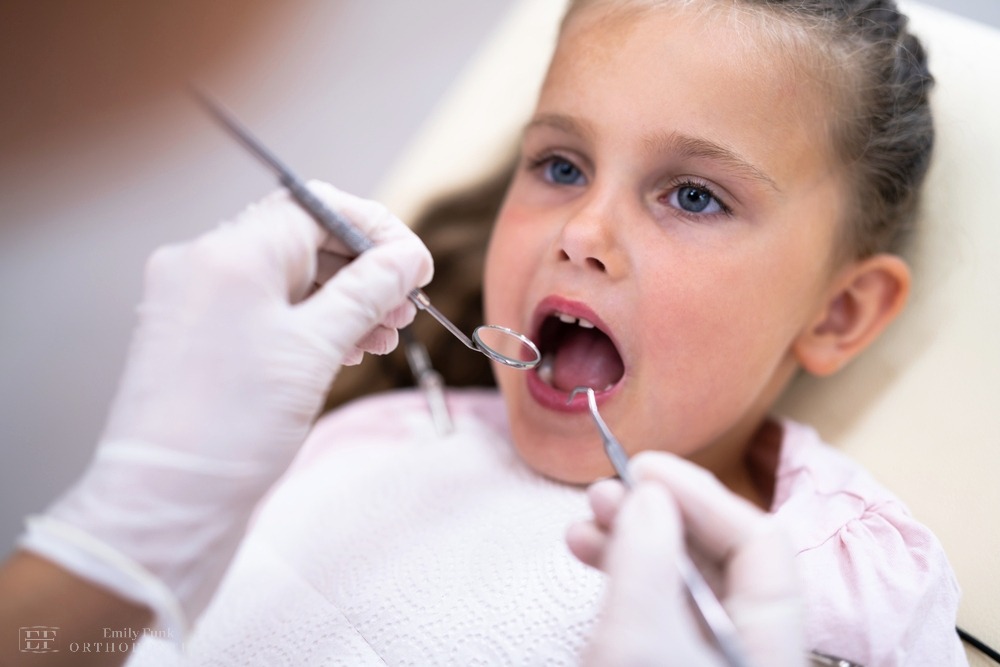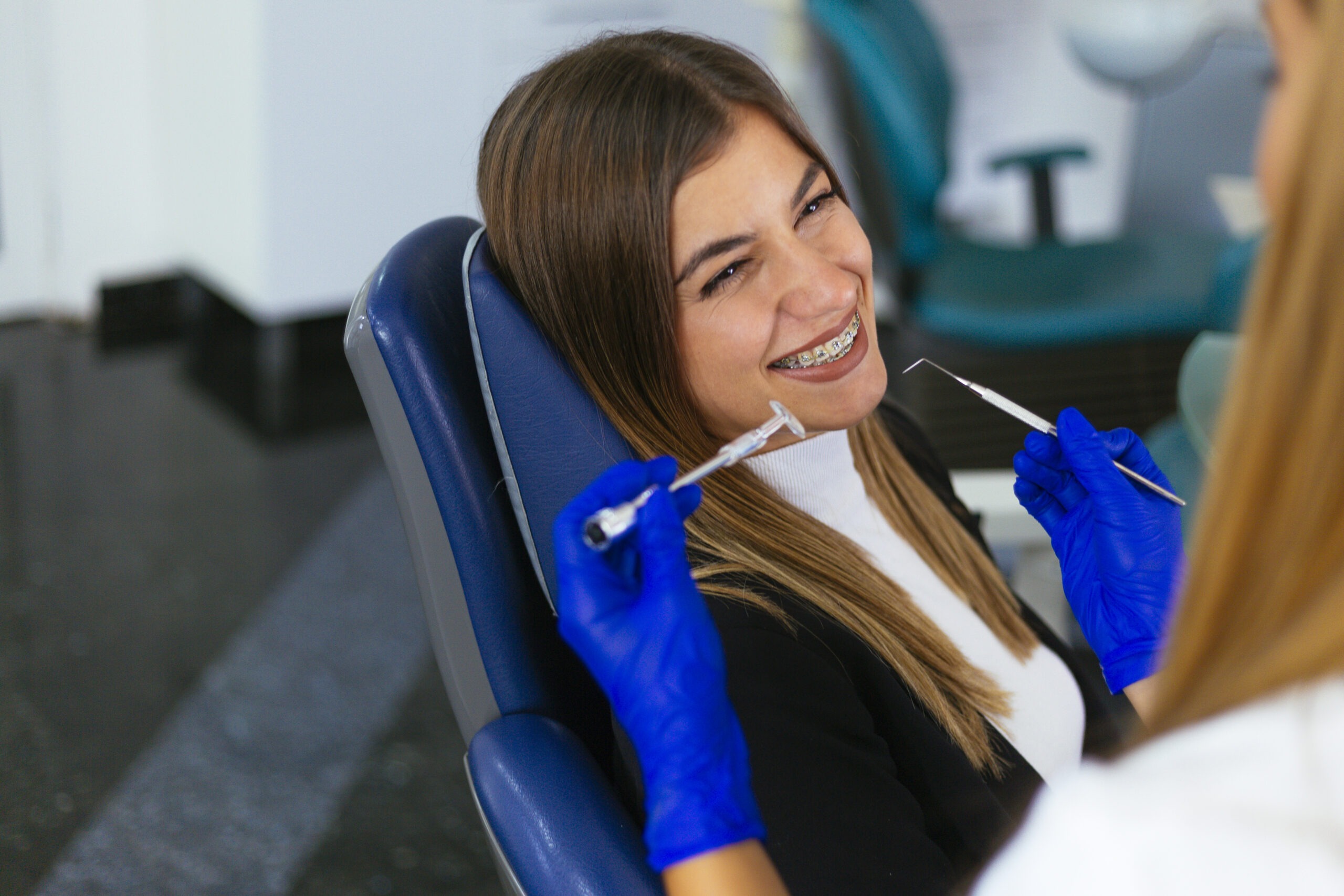When wondering how to fix overbite in Chester Springs, PA, the first step is visiting a trusted orthodontist. They will assess your teeth and recommend the best treatment options. Common methods include braces, Invisalign, or advanced orthodontic devices. A plan tailored to your needs, budget, and lifestyle will ensure the best results.
At Emily Funk Orthodontics, we specialize in creating personalized treatment plans to help you achieve a healthy, confident smile. With modern orthodontic tools, treatments are now faster, easier, and more comfortable.

What is an Overbite?
An overbite occurs when the upper teeth overlap the lower teeth. While some overlap is normal, excessive overlap can create problems such as:
- Jaw pain.
- Difficulty speaking clearly.
- Tooth damage or excessive wear.
Fixing an overbite does more than improve your appearance. It protects your oral health in the long run. Orthodontists in Chester Springs use updated tools and techniques to treat overbites effectively.
Why Fixing an Overbite is Important
An overbite is more than a cosmetic issue. Untreated, it can lead to several problems, including:
- Tooth Damage: Misaligned teeth wear unevenly or chip more easily.
- Jaw Pain: An improper bite can strain the joints and cause discomfort or headaches.
- Speech Challenges: Certain sounds may be harder to pronounce.
- Low Self-Esteem: A noticeable overbite can make you feel self-conscious about your smile.
Correcting an overbite improves your smile, comfort, and overall quality of life.
How Are Overbites Diagnosed?
Step 1: Initial Consultation
Your orthodontist will examine your teeth, alignment, and jaw. They will ask about any pain, discomfort, or difficulty chewing.
Step 2: Imaging and Evaluation
X-rays, photos, and 3D scans will help the orthodontist understand the severity of your overbite. This step is crucial for developing a suitable treatment plan.
Step 3: Treatment Plan
Using the diagnostic results, the orthodontist will create a personalized plan based on:
- How severe your overbite is.
- Your age and stage of dental development.
- Your jaw and teeth’s overall condition.
The orthodontist will review your options and ensure you understand the treatment process.
Methods for Correcting an Overbite
Orthodontists in Chester Springs offer multiple solutions to fix overbites:
Braces
Braces are one of the most common methods to correct overbites. They fix tooth alignment and can also adjust the jaw position.
Benefits of braces:
- Suitable for mild, moderate, and severe overbites.
- Provide excellent long-term results.
- Options like clear or ceramic braces are available for a less visible look.
Braces work well for patients of all ages, especially teens and adults.
Invisalign
Invisalign uses clear, custom-made aligners to gradually shift teeth into position. It’s a popular alternative to braces.
Advantages of Invisalign:
- Nearly invisible, making it a discreet treatment option.
- Aligners are comfortable, removable, and easy to clean.
- Ideal for people with mild or moderate overbites.
Invisalign allows you to maintain good oral hygiene while undergoing treatment.
Retainers
Retainers can be used to fix minor overbites, particularly in younger patients. These devices also help maintain alignment after orthodontic treatment.
Jaw Surgery
For severe overbites caused by skeletal issues, jaw surgery may be required. This procedure repositions the jaw to correct alignment problems. It is typically advised for adults when braces alone cannot resolve the issue.
Growth Modifiers
For children aged 7–14, devices like headgear or expanders guide jaw development. These prevent an overbite from becoming worse as the child grows.
What Happens During Treatment?
Treating an overbite involves several steps:
- Consultation: Your orthodontist will evaluate your bite, discuss concerns, and recommend a treatment plan.
- Start of Treatment: Braces, aligners, or other appliances are placed.
- Adjustments and Monitoring: Regular visits ensure the treatment is on track. Adjustments may be needed to guide progress.
- Completion: Once your overbite is corrected, braces or aligners will be removed. A retainer will be provided to maintain the results.
Maintaining Results
After treatment, it’s essential to follow these steps to keep your teeth and jaw in place:
- Wear a Retainer: This prevents your teeth from shifting back to their original positions.
- Practice Good Oral Hygiene: Brush and floss daily and clean your retainer or aligners thoroughly.
- Continue Regular Checkups: Routine visits to your orthodontist and dentist are important for maintaining good dental health.
Dr. Tate Chauncey, an experienced orthodontist in Henderson, NV, advises patients to maintain good oral hygiene and wear retainers diligently to ensure their corrected overbite stays aligned.
How Long Does Overbite Treatment Take?
The length of treatment will depend on the severity of the overbite and the chosen method. On average:
- Braces may take 1 to 3 years.
- Invisalign treatments typically last 1 to 2 years.
- Jaw surgery requires additional recovery time.
Your orthodontist will give you a clear timeline during your consultation.
Costs of Fixing an Overbite
The cost of correcting an overbite varies depending on the treatment method:
- Braces typically cost between $3,000 and $7,000.
- Invisalign can range from $4,000 to $8,000.
- Surgery for severe cases may cost up to $20,000.
At Emily Funk Orthodontics, we offer payment plans to make treatment more affordable. Your orthodontist will provide a detailed cost estimate and discuss your options.

Why Choose Emily Funk Orthodontics in Chester Springs, PA?
Patients in Chester Springs trust Emily Funk Orthodontics for caring, high-quality orthodontic treatment. Here’s what sets us apart:
- Experienced Team: We specialize in treating overbites of all types and ages.
- Modern Techniques: We use advanced tools like 3D imaging to ensure precision.
- Affordable Options: Flexible payment plans help make orthodontic care accessible.
- Family-Friendly Care: We provide a welcoming, supportive environment for patients and families.
Get Started Today
Don’t let an overbite hold you back. Contact Emily Funk Orthodontics in Chester Springs, PA, to schedule your consultation. During your visit, we’ll:
- Examine your teeth, bite, and jaw.
- Discuss the best treatment options for your needs.
- Provide a detailed plan, including cost and timeline.
A healthier, more confident smile is closer than you think. Call us today and take the first step toward a better you!
About the Authors
Dr. Emily Funk-Reynolds – Orthodontist in Chester Springs, PA
Dr. Tate Chauncey – Orthodontist in Henderson, NV
Frequently Asked Questions
How expensive is it to fix overbite?
On average, you might be looking at anywhere from $2,000 to $6,000 for traditional braces or clear aligners. If you need more extensive work, like jaw surgery, the price could go up to $10,000 or more. But don’t worry! Many dental insurance plans cover a portion of orthodontic treatments, and lots of orthodontists offer payment plans to make it more manageable.
How to fix overbite naturally?
Start by being mindful of your tongue position – try keeping it at the roof of your mouth when you’re not talking or eating. Practice good posture, too – it can make a big difference! Chewing sugar-free gum can help strengthen your jaw muscles, and don’t forget to avoid habits like thumb-sucking or nail-biting. Try some facial exercises, like smiling wide and holding it for a few seconds. Remember, these natural methods take time, so be patient and consistent.
What is the best age to fix an overbite?
The best age to fix an overbite is typically during childhood or early adolescence, usually between the ages of 7 and 14. This is because the jaw and teeth are still developing, making them more responsive to orthodontic treatment. However, don’t worry if you’re past this age range! It’s never too late to address an overbite. Many adults successfully correct their overbites and achieve beautiful smiles.
What happens if you don’t fix an overbite?
Your teeth could wear down unevenly, which can lead to sensitivity and even tooth loss. You might also experience jaw pain or headaches, and it could affect your speech or ability to chew properly. Plus, an untreated overbite can change the shape of your face over time, potentially impacting your self-confidence. Don’t worry, though – there are plenty of treatment options available.
 Free Consult
Free Consult
